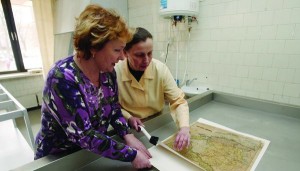TALLINN — Women working the same job as their male counterparts in Estonia are likely to earn 40 percent less on average according to a new World Economic Forum report.
Estonia ranks 98th for wage equality for similar work out of 134 countries surveyed. The new statistics were released this week in the World Economic Forum Gender Gap Report for 2009.
The country is also, according to an independent monitoring body in Estonia, the worst in the European Union. Margit Sarv, the Gender Equality and Equal Treatment Commissioner of Estonia told Baltic Reports that there were a number of reasons why women earn less, but pointed out that two thirds of discrepancies couldn’t be reasonably attributed.
“Two thirds of the wage gap cannot be explained — it could be discrimination, but you cant explain it with objective reasoning using education, family responsibility, segregation and so on,” Sarv said.
She suggested that while the report slightly contradicted the findings of local researchers, that the gap is still large.
“For the large part its because of segregation on the labor market, both horizontal and vertical — women work in different sectors than men. In sectors dominated by men, men earn more. For women-dominated sectors, like education and service sectors, it is good for women,” she said.
Experts agree that there is also a cultural belief that men should earn more than women for the same jobs. This combined with the secrecy and privacy around wage negotiations in Estonian culture means that staff members often can’t compare salaries, allowing the trend to continue in secret.
“We apply the stereotypes in which a woman can work at a lower salary than a man,” Talves Kairi, a research fellow of the Sociology and Social department of Tartu University told local media. “Women value their work less, and especially in areas where men are dominant.”
Sarv agrees with Kairi that the pay gap arises from Estonia’s traditional gender roles.
“Many people still believe that the man is the bread winner and the woman is in charge of the family and her wage is just an addition. Many people believe that men’s wages should be higher,” she said.
Separate research has shown that Estonian nationals who speak the state language suffer less than the rest of the population, which includes both first and second generation immigrants.
The gender pay gap is larger among non-Estonians. Some 29 percent of Estonian women earn less than their male counterparts compared to 35 percent among non-Estonians, according to Sarv. Men also earn less 15 percent less if they are not Estonian.
Estonia scored higher in other measures, though, equal first places for the ratio of professional and technical workers, outnumbering men in these professions 2.18 to 1. Overall it was ranked 37th in the Gender Gap Report.
Pan-Baltic sexism
Latvia and Lithuania scored marginally better than Estonia in the wage equality for similar work, ranking 71st and 88th respectively. Latvia ranked highest among the Baltic states overall in 14th place and Lithuania ranked 30th.
In Lithuania, women’s rights nonprofit organization New Generation Women’s Initiatives told Baltic Reports that the crisis is exacerbating the problem as employers move to exploit the culture of underpaid women.
“The economic crisis allows the employers to exploit women more easily, because men are now more often fired and women are hired for a smaller salary than ever. So now the Lithuanian women are both the breadwinners and also carry on with their unpaid work at home,” Laima Trofimovienė, New Generation Women’s Initiatives spokeswoman, said.
“Their salaries are getting smaller, men get fired and they continue to have the responsibility of household work,” she added.
Julija Mažuoliene, head of the New Generation Women’s Initiatives, said its hard to change the established norms in society because of a lack of dialogue among the employers, employees and specialists of equal opportunities.
Iceland, Finland and Norway came in first, second and third respectively overall in the survey.
The survey was published by World Economic Forum, which is a Geneva-based nonprofit foundation best known for its annual meeting in Davos, Switzerland which brings together top business leaders, international political leaders, selected intellectuals and journalists to discuss the most pressing issues facing the world including health and the environment.













